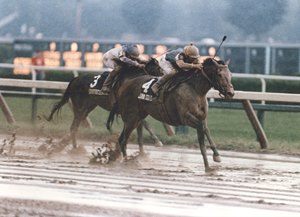Looking Back 30 Years to the 1987 Travers


If all goes as planned Aug. 26, the $1.25 million Travers Stakes presented by NYRA Bets (G1) will feature the first Travers field with three different classic winners in 35 years–when Canadian invader Runaway Groom flew from out of the clouds to shock Aloma's Ruler, Conquistador Cielo, and Gato del Sol in 1982.
This Saturday’s race will also mark the 30th anniversary of a Travers that featured one of the most loaded fields and was one of the most frenetically run versions of the event in recent times.
The 1987 cast included the colts who captured that year's major 3-year-old grade 1 races with Kentucky Derby and Preakness Stakes winner Alysheba, Belmont Stakes and Haskell Invitational Handicap winner Bet Twice, Whitney Handicap winner Java Gold, Metropolitan Handicap and Wood Memorial Invitational Stakes winner Gulch, Swaps Stakes and Santa Anita Derby winner Temperate Sil, Florida Derby winner Cryptoclearance, American Derby winner Fortunate Moment, and the grade 2 Jim Dandy Stakes winner Polish Navy.
The race also featured five jockeys that are now enshrined in the Hall of Fame.
There was an added spectacle surrounding the race—a report that an attempt would be made to drug favored Alysheba, leading to him being tested an extra time over the others, though the results were negative.
A fuzzy replay on YouTube is currently the only memorialization of the race online.
The outcome of the Travers had a lot to do with that morning’s downpour and what happened early on in the race, when Temperate Sil, trained by Hall of Famer Charlie Whittingham and ridden by the legendary Bill Shoemaker, made a determined run for the lead into the first turn while taking heavy pressure from longshot Gorky.
Trained by Hall of Famer Leroy Jolley, Gorky was entered purely as a rabbit for Jolley’s other entrant, Gulch. Under journeyman Tony Graell, Gorky remained pasted to Temperate Sil through hot fractions of :23 2/5, :46 1/5, and 1:10. No Travers winner had won going that fast since Man o' War. Shoemaker, then age 56 with three Travers belts and one year removed from having won his fourth Kentucky Derby on Ferdinand, told The Blood-Horse after the race that he couldn’t get his opponent up front "to back off."
As they tore through the mud, Hall of Fame jockey Jose Santos was licking his chops on the rail in third aboard Ogden Phipps’ Polish Navy. Riding for Hall of Fame trainer Shug McGaughey, Santos was sitting comfortably about 10 to 12 lengths off the leaders when jockey Craig Perret made his move with Bet Twice outside him approaching the far turn. The two horses flew together past the leaders, appearing as though they would decide the outcome. But that was just the first wave.
Hall of Fame jockey Angel Cordero Jr, who won 14 riding titles at Saratoga, brought Cryptoclearance down the lane like a freight train. Bet Twice backed out of it. Polish Navy carried on, but couldn’t keep pace—he didn’t appear to relish the soggy conditions. Cordero Jr. timed his move well, assuming the lead in mid-stretch.
In normal circumstances Cordero would have put the race to bed, but Hall of Fame jockey Pat Day summoned the kick of Java Gold’s father—1972 Travers winner Key to the Mint—and unleashed one of the more eye-catching moves in the race's history to capture it for Hall of Fame trainer Mack Miller under the Rokeby colors of the colt’s owner, Paul Mellon. Unseen on the video screen since the run out of the gate, Java Gold arrived on the scene like a bolt of lightning with about 30 seconds left and gobbled up the slop for fun.
In the Los Angeles Times, Miller praised the handling of his colt by Day. “He has the patience and never gets unnerved. He had him outside where he was supposed to be, and when this horse changes leads, he kicks in and it works. The ride was the big thing. I just love Pat Day."
In The Blood-Horse issue of Aug. 29, 1987, Day returned the compliment. “Knowing the kind of horse I was on, and the hands he’s in, gave me the liberty to ride him with confidence.” Just two weeks earlier in the Whitney, they had beaten one of the top older horses in Broad Brush as well as 3-year-old standout Gone West.
The New York Times reported that Day noted the wet track as a factor in the Travers. ''You can't put as much into the result as you would, because of the track condition,'' Day said. ''It may have been detrimental to some of the other horses. But my horse, I think he'd run over broken bottles if you asked him to. I think the best horse won.''
Both Jolley and Miller were inducted into the National Museum of Racing and Hall of Fame earlier in that summer of 1987. Hall of Fame enshrinement came in 1993 for Alysheba, the Jack Van Berg trainee who finished 20 lengths back of Java Gold.
Alysheba's Hall of Fame jockey Chris McCarron blamed the Travers outcome on the mud.
"When he got hit in the face with the slop, he didn't like it and just stopped trying," he told The Blood-Horse.
Fellow Hall of Famer Van Berg related another comment by McCarron to The Blood-Horse. "Chris said he was floundering, said his legs were going 80 miles an hour and he wasn't going anywhere."
Alysheba rebounded, taking nine grade 1 races after the Travers, culminating in the 1988 Breeders' Cup Classic, the first of five McCarron would win.
Java Gold and Day employed their late-running tactics once again to a spectacular victory in the Marlboro Cup Invitational Handicap (G1) at Belmont Park, before the colt ran second in his career finale to the Woody Stephens-trained Creme Fraiche in the Jockey Club Gold Cup (G1) at Belmont in October, when he fell victim to a slow early pace.
